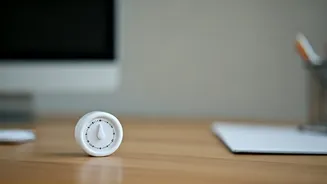Understanding Procrastination's Grip
Procrastination, a common human experience, frequently stems from a complex interplay of factors, often leading to avoidance and missed opportunities.
The root causes extend beyond simple laziness, touching upon elements such as perfectionism, fear of failure, or a lack of clarity in task objectives. The tendency to delay can generate a vicious cycle, where avoiding a task increases anxiety, making the task seem even more challenging. Consequently, this avoidance behavior impacts productivity, and can diminish self-esteem. To effectively combat procrastination, it's essential to understand its underlying triggers and develop targeted strategies for overcoming them. Ignoring procrastination can lead to stress, reduced quality of work, and ultimately, a feeling of being constantly behind. Recognizing the multifaceted nature of procrastination helps in developing appropriate, personalized solutions.
Introducing The 2-Minute Rule
The 'Two-Minute Rule' presents a straightforward tactic for dealing with procrastination. This rule advocates for starting a task by committing to it for just two minutes. The essence of the rule is to diminish the initial hurdle to action. Many times, the most challenging part of any undertaking is simply beginning. By focusing only on a very brief commitment, the rule minimizes the perceived effort required, thus reducing the likelihood of postponing the task. This technique is especially useful for tasks that tend to be avoided due to their magnitude or complexity. The two-minute duration serves as a psychological trick, tricking the brain into initiating action without feeling overwhelmed. Furthermore, it allows individuals to break down large, potentially daunting projects into smaller, more manageable parts, making the overall goal more attainable.
How It Rewires Your Brain
The effectiveness of the Two-Minute Rule resides in its ability to rewire your brain's habits and responses to work. By regularly engaging in tasks, even for a short duration, the brain begins to associate those activities with feelings of accomplishment and satisfaction. This positive reinforcement gradually weakens the link between a task and any associated sense of dread or anxiety. This method also aids in developing momentum. Successfully completing even a small task can produce a 'snowball effect', where the initial progress encourages individuals to continue. It is a powerful way to change deeply ingrained habits. The brain is remarkably adaptable, and consistently engaging in small actions changes the neural pathways. This process promotes a shift from procrastination to proactivity, fostering better productivity and a heightened sense of control.
Practical Applications In Action
The Two-Minute Rule can be employed in a wide array of activities, improving various aspects of daily life. For instance, if you're avoiding exercise, commit to exercising for just two minutes. If you are struggling with a complex work project, dedicate the first two minutes to outlining a simple plan. The trick is to identify the tasks you usually put off and create small, doable steps. For someone wanting to improve their reading habit, commit to reading for two minutes a day. The key is to select tasks that you often avoid and break them down into very small, easily achievable parts. The purpose is not necessarily to complete the whole task, but to overcome the initial resistance. The cumulative effects of consistently using the Two-Minute Rule can be transformative. It makes the tasks seem less intimidating and enables more effective time use.
Benefits and Long-Term Effects
Embracing the Two-Minute Rule provides a variety of advantages, both immediate and far-reaching. The initial benefit is the reduction of procrastination, leading to increased productivity and more efficient time management. Starting small tasks creates a sense of achievement, which helps to build momentum and inspire further work. Regular usage of the rule can cultivate healthier habits and a better sense of discipline. Additionally, it helps to boost confidence by teaching you how to overcome challenges. The long-term impact extends beyond improved productivity. It may boost mental wellness by reducing stress associated with unfinished work. Over time, the Two-Minute Rule facilitates the development of a proactive mindset, helping to reshape behavior. Consistently applying the Two-Minute Rule can transform your approach to any challenge, establishing more control and leading to lasting positive changes in your life.















